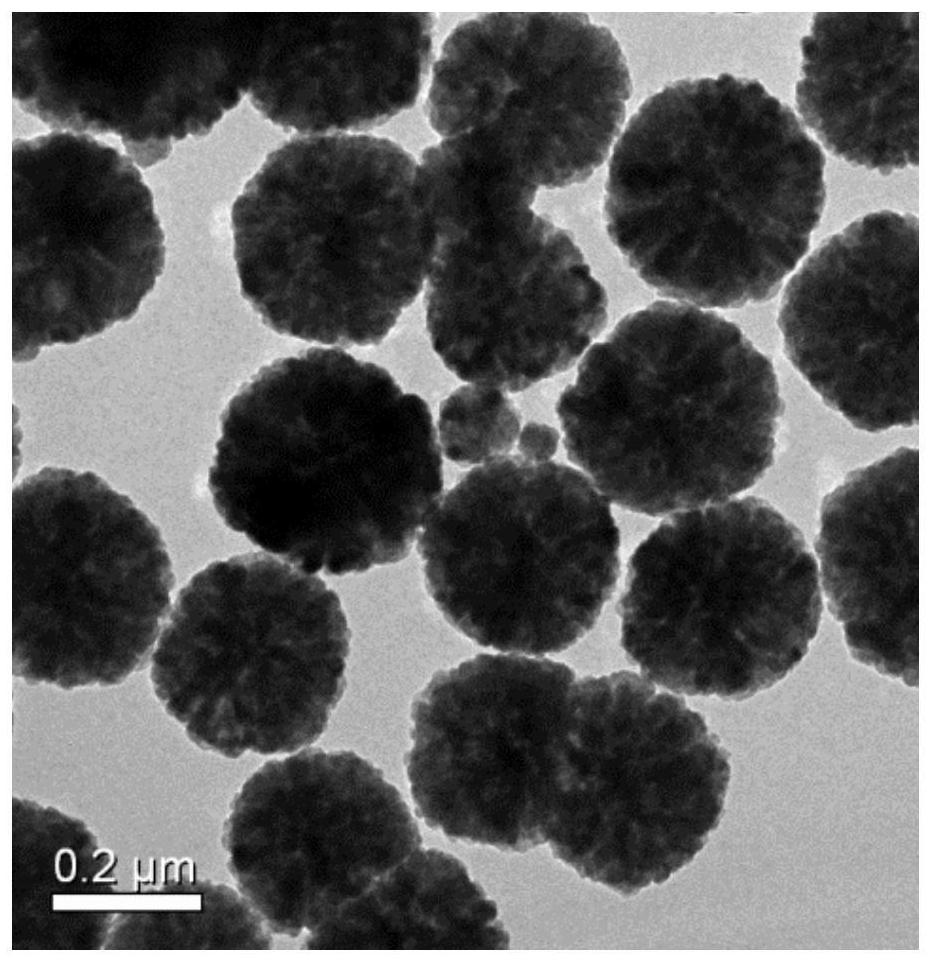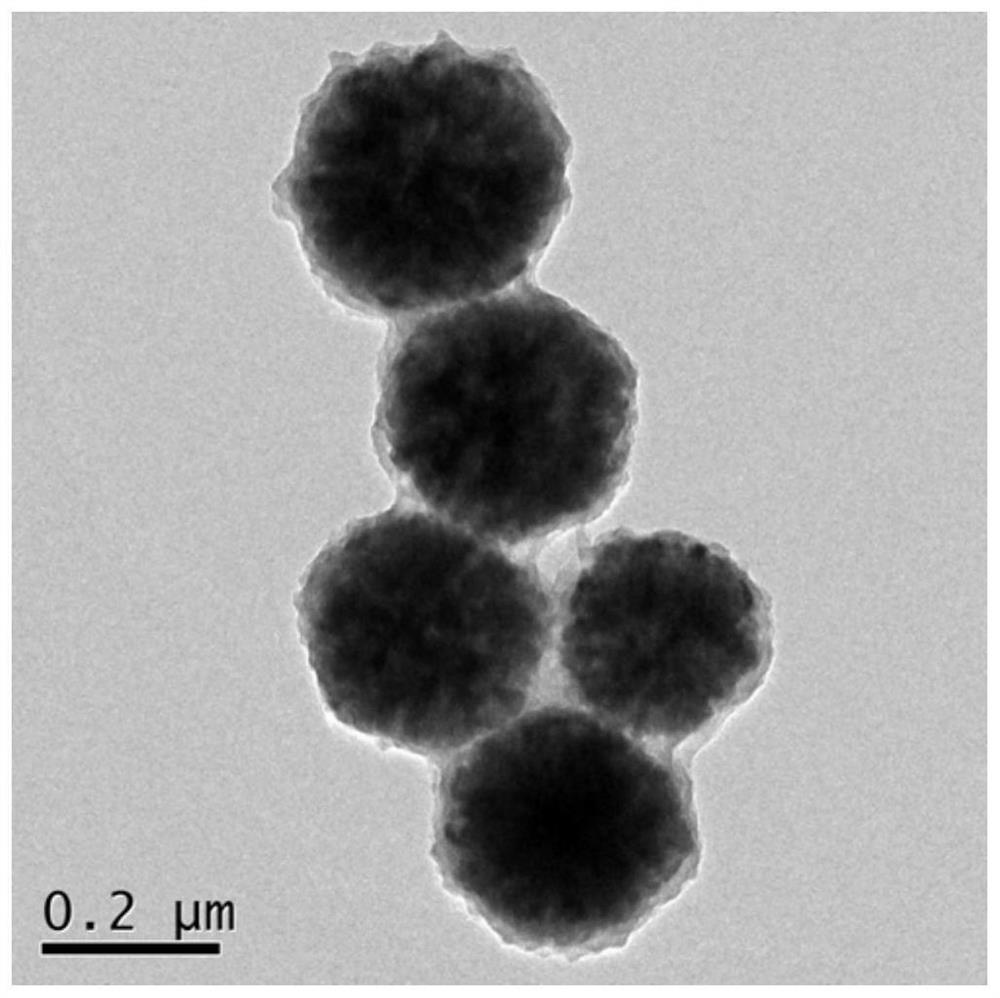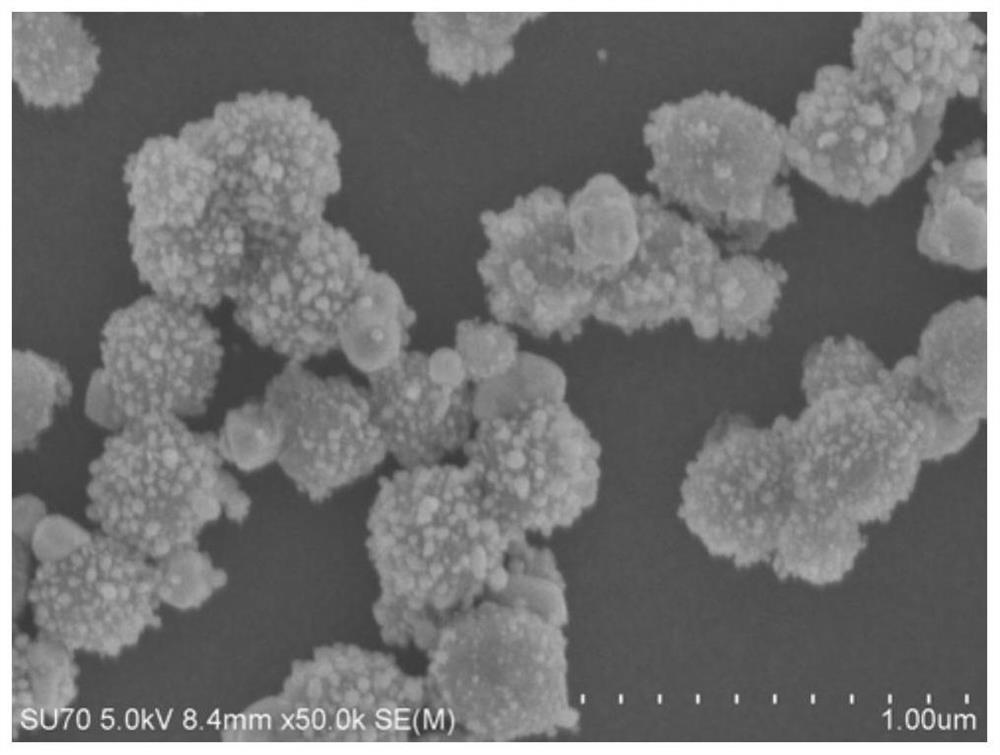A recyclable immunoassay for tumor markers based on core-shell nanomaterials
A technology of core-shell nanomaterials and immunoassay methods, which is applied in the direction of analysis of materials, material excitation analysis, ferrous iron oxides, etc., can solve the problems of high cost and unfavorable practical application, and achieve enhanced efficiency and simple sample cleaning and separation fast effect
- Summary
- Abstract
- Description
- Claims
- Application Information
AI Technical Summary
Problems solved by technology
Method used
Image
Examples
Embodiment 1
[0030] a Fe 3 O 4 / TiO 2 / Ag triple core-shell nanomaterial and its direct recyclable immunodetection method for prostate specific antigen PSA, comprising the following steps:
[0031] 1. Fe 3 O 4 / TiO 2 Preparation of Ag / Ag triple core-shell nanomaterials
[0032] (1) Dissolve 3.5 grams of ferric chloride hexahydrate, 10.8 grams of sodium acetate and 3 grams of polyethylene glycol in 120 milliliters of ethylene glycol, ultrasonically until completely dissolved, transfer to a hydrothermal reactor, and heat at 200° C. The reaction was carried out for 10 hours, and the precipitate was collected after centrifugation and washing with ethanol to obtain Fe 3 O 4 Nanoparticles;
[0033] (2) Weigh 50 mg of Fe obtained in step (1) 3 O 4 The nanoparticles were dissolved in an aqueous solution of hydrochloric acid with a concentration of 0.1 mmol / ml and ultrasonicated for 15 minutes, magnetically separated and washed three times with deionized water; after magnetic separation a...
Embodiment 2
[0050] With above-mentioned embodiment 1, its difference is: Fe 3 O 4 / TiO 2 In the preparation of Ag core-shell nanomaterials: in step (1), 1.35 g of ferric chloride hexahydrate, 3.6 g of sodium acetate and 1.0 g of polyethylene glycol were dissolved in 40 ml of ethylene glycol, and ultrasonicated until completely dissolved. , transferred to a hydrothermal reactor, reacted at 200°C for 10 hours, centrifuged and washed with ethanol to collect the precipitate to obtain Fe 3 O 4 Nanoparticles; the volume of tetrabutyl titanate added in step (2) is 1 ml.
[0051] Figure 10 For the Raman spectrum, the frequency shift is 1264cm -1 The graph of the characteristic peak intensity changes with the concentration of the antigen to be tested. It can be seen by fitting that when the concentration of the antigen to be tested changes from 100 pg / ml to 0.1 mg / ml, the Raman characteristic peak intensity changes linearly with the concentration. The fitting result shows that this change t...
Embodiment 3
[0053] With above-mentioned embodiment 1, its difference is: Fe 3 O 4 / TiO 2 In the preparation of Ag core-shell nanomaterials: in step (1), 6.75 grams of ferric chloride hexahydrate, 18.0 grams of sodium acetate and 5.0 grams of polyethylene glycol were dissolved in 200 ml of ethylene glycol, and sonicated until completely dissolved. , transferred to a hydrothermal reactor, reacted at 200°C for 10 hours, centrifuged and washed with ethanol to collect the precipitate to obtain Fe 3 O 4 Nanoparticles; the volume of tetrabutyl titanate added in step (2) is 6 ml.
[0054] Figure 11 For the Raman spectrum, the frequency shift is 1264cm -1 The graph of the characteristic peak intensity changes with the concentration of the antigen to be tested. It can be seen by fitting that when the concentration of the antigen to be tested changes from 100 pg / ml to 0.1 mg / ml, the Raman characteristic peak intensity changes linearly with the concentration. The fitting result shows that this...
PUM
| Property | Measurement | Unit |
|---|---|---|
| diameter | aaaaa | aaaaa |
Abstract
Description
Claims
Application Information
 Login to View More
Login to View More - R&D
- Intellectual Property
- Life Sciences
- Materials
- Tech Scout
- Unparalleled Data Quality
- Higher Quality Content
- 60% Fewer Hallucinations
Browse by: Latest US Patents, China's latest patents, Technical Efficacy Thesaurus, Application Domain, Technology Topic, Popular Technical Reports.
© 2025 PatSnap. All rights reserved.Legal|Privacy policy|Modern Slavery Act Transparency Statement|Sitemap|About US| Contact US: help@patsnap.com



